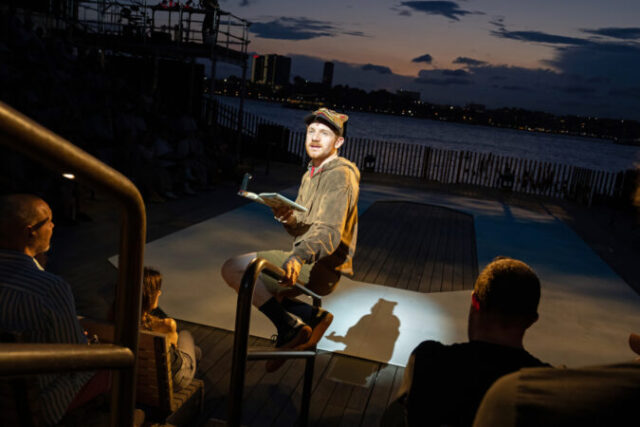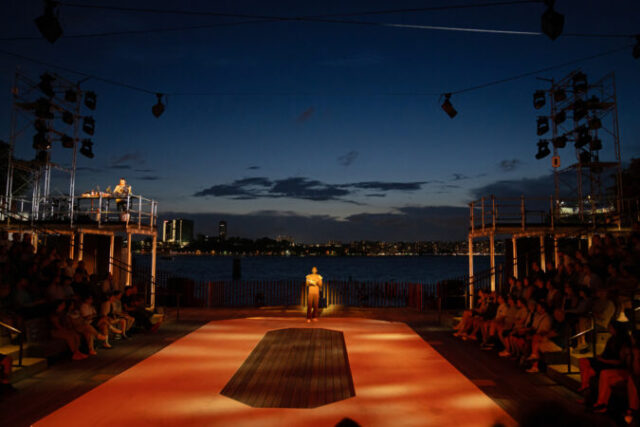
Chris Perfetti is one of three actors who portray a queer mountain lion in Open Throat on Little Island (photo by Julieta Cervantes)
OPEN THROAT
The Amph at Little Island
Pier 55, Hudson River Park at West Thirteenth St.
July 10-14, $25, 8:30
littleisland.org
In the theater, an actor is said to be “on book” if they are using the script onstage. Most often this occurs in previews because they are still working on their lines. A performer can also be on book if they are a last-minute replacement or, as in the case of the protagonist in Marin Ireland’s current Pre-Existing Condition, as a directorial choice relating to the character’s state of mind.
The full cast is on book — literally — in Henry Hoke’s expert adaptation of his highly acclaimed 2023 novel, Open Throat. Throughout the eighty-minute play, the actors read from either the hardcover or paperback edition as they walk across the spare set at the Amph on Little Island, the 687-seat open-air theater that borders the Hudson River. Because of rights issues, and probably also because there are only five performances of the piece, which was commissioned for the space, it had to be a staged reading with scripts in hand, but director Caitlin Ryan O’Connell uses that to her advantage, as the play becomes a celebration of the written word as well as clever stagecraft.
The story is narrated by a queer mountain lion (portrayed first by Chris Perfetti, then Calvin Leon Smith and Jo Lampert) living under the Hollywood sign in the Los Angeles hills, avoiding confrontations with humans, unwilling to be the hunter or the hunted, instead surviving on bats and small animals. “I’ve never eaten a person but today I might,” the lion says early on. The lion, who was inspired by P-22, a puma who lived for ten years in Griffith Park in LA, has no name; a young man in a homeless tent city calls the lion “fucker cat,” “shitfuck cat,” or “goddamn fuck cat.” His mother gave him a name he cannot share and people would be unable to pronounce, while his father gave him a name he won’t repeat. It’s all part of his search for his identity and his place in a foreign world he is trying to understand.
As the lion ventures closer to humans and vice versa, impeding on each other’s territory, the lion encounters a scary man who cracks a whip, a gay couple having sex in a cave, a woman yapping away on a phone, and various hikers and tourists. The lion listens as the people discuss capitalism, therapy, veganism, and dating. But the lion’s life changes dramatically when taken in by a young woman named slaughter who has domestication on her mind.

Henry Hoke’s Open Throat begins just as the sun sets over the Hudson River (photo by Julieta Cervantes)
Open Throat is a beguiling parable about personal identity, family, language, and being part of a community. It feels right at home in the Amph, surrounded by grassy hills, wind whipping through trees, and, on the west side, a beckoning river. At one point, just when the lion is describing how a young man in town refers to machines flying in the sky as “fucking helicopters,” a helicopter actually flew over the water. Unfortunately, many more did, creating loud distractions. The lion often refers to the “long death,” which is a busy street where many animals have met their end, being hit by cars; it’s hard not to compare that to the West Side Highway, which must be crossed in order to enter Little Island. And there are numerous mentions of “a deep forest on the edge of the water,” which is an apt description of the environment encircling the Amph.
Noah Mease’s set features a large, octagonal “O” on the floor; the missing center is represented twice as an object on which Steven Wendt makes shadow puppets with his hands, depicting moments from the lion’s past with his parents, including a poignant kill. Wendt also makes ingenious analog sound effects from atop a scaffold balcony. Perfetti, Smith, and Lampert each brings a different flavor to the lion, involving gender, color, and sexuality, as if any one of us could be the crafty animal. The rest of the characters are played by Marinda Anderson, Alex Hernandez, Layla Khoshnoudi, Ryan King, and Susannah Perkins, moving from the wings to the aisle steps to a balcony; rising star Perkins — she’s excelled in such plays as Grief Hotel, The Welkin, The Wolves, The Low Road, and The Good John Proctor — is particularly effective as the young slaughter, adding depth and nuance while having clearly memorized many of her lines.
Mease also designed the props and masks — each lion portrayer has a small costume element that identifies them as a cat — although they are kept to a minimum. Most of the props are imaginary, and cast members’ appearances do not change in order to match the text. The superb lighting, which emerges as the sun sets, is by 2024 special Drama Desk Award winner Isabella Byrd, with playful choreography by Lisa Fagan and immersive sound and music by Michael Costagliola. O’Connell (King Philip’s Head Is Still on That Pike Just Down the Road, Twin Size Beds) directs with a sure hand, whether depicting a tragic fire, an animal fight, an earthquake, or a road trip; a Disney dream sequence is the only scene that felt out of place. Even the actors using the script becomes organic to the tale.
Not only is the Amph itself a kind of character in the narrative but so is New York City. “they talk about new york a lot in ellay / in new york you don’t need a car,” the lion says. (The book contains no punctuation, and only the pronoun “I” is capitalized, furthering the idea of establishing one’s identity.)
“is new york where I have to go,” the lion asks. The answer is a resounding yes, as Open Throat could not have happened quite like this anywhere else.
[Mark Rifkin is a Brooklyn-born, Manhattan-based writer and editor; you can follow him on Substack here.]